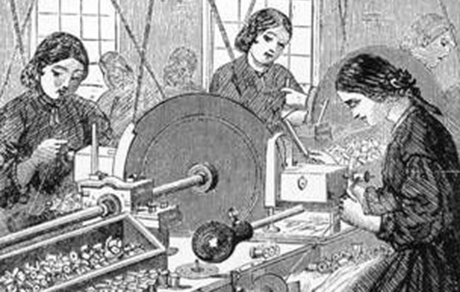How the Derwent Valley changed the World

How the Derwent Valley Changed the World!
This is the story of the industrial revolution (1750-1830) – a time of great change in Britain’s history when we were transformed from a nation of mainly farm workers to a nation of mainly factory workers. Machines were invented that could do the work of many men in much less time. Inventors and businessmen built factories to put these machines in and employed workers to operate them. They built communities for the workers to live in. England became known as the Workshop of the World – what happened here was to be copied all over the world. The cotton textiles industry was one of the most important in the industrial revolution. It employed many thousands of men, women and children in its mills. Children as young as 7 were sometimes employed, but usually they started at about 9 years old. Mill owners, Richard Arkwright and Jedediah Strutt believed that children should be able to read and write before they started work. They wanted to look after the workers and their families so they would stay there and work at their mills. But conditions were still very tough compared to life today.
The Millworkers’ Day
Imagine having to start work at 6 o’clock in the morning six days a week and finishing a hard day 12 hours later. But even though they worked hard the millworkers’ money soon went on rent for their cottage and other expenses. The mill owners took this money straight from their wages. Children also had to pay forfeits out of their wages, for bad behaviour. Forfeits had to be paid for coming in late, looking out of the window, being cheeky or accidentally damaging machines. Mischievous behaviour like playing piggy-back or throwing bobbins around the room would get the children in serious trouble with the dreaded overseer who was always looking out for people who were not doing their work properly. Sometimes children went to work with their mothers and aunties.
Why are the Derwent Valley Mills so important?
The Derwent Valley has been called the birthplace of the Industrial Revolution because many things which began here were copied throughout Britain and the world.
John Lombe’s Silk Mill at Derby is thought to be the first factory in the world. Richard Arkwright’s Mill at Cromford was the first successful water-powered cotton mill in the world. Arkwright’s methods of controlling his workforce and organising production, have caused him to be known as the father of the factory system. Masson Mill is a brilliant example of one of his later mills. William Strutt’s North Mill used amazing new engineering techniques to make the building fireproof. His ideas were copied all over the world.
In 2001 the Derwent Valley Mills were named as a World Heritage Site because they are such an important part of our history and because they can still be seen today.

